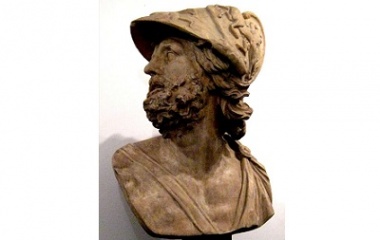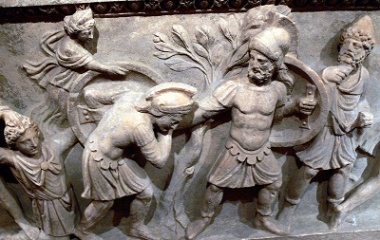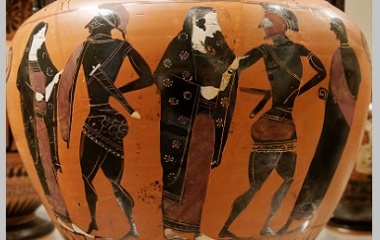- Pronunciation: men-ley-uh-s
- Origin: Greek
- Parents: Atreus, Aerope
- Wife: Helen
- Siblings: Agamemnon
- Children: Hermione
Who Is Menelaus?
In the epic legends of Homer, Menelaus was the King of Sparta. He started his life as a mortal. The elder son of King Atreus and Queen Aerope of Mycenae was Menelaus’ brother, Agamemnon, a great warrior. Menelaus became a key figure in the Trojan War due to the abduction of his wife Helen, the beautiful daughter of Zeus and step-daughter of King Tyndareus through his marriage to her mother, Leda. She is most famously known as Helen of Troy.
Interference by the goddess Aphrodite caused Helen’s betrayal of her marriage to Menelaus with Prince Paris of Troy, and led to the siege of the city.
Origin
In ancient Greece prior to the fifth century, the father and uncle of Menelaus were in a lengthy battle over the throne of Mycenae. His uncle, Thyestes, became the king after his cousin Aegisthus murdered Atreus. Menelaus and his older brother Agamemnon were banished from the city and went into exile.
Eventually, the brothers gained the support of King Tyndareus of Sparta and returned to dethrone Thyestes. Agamemnon, as the elder of the two brothers, took the throne.
Meanwhile, back in Sparta, it was time for the step-daughter of King Tyndareus to marry. Helen had many suitors and she requested an oath from Odysseus and his men to protect her future husband. Finally, she chose Menelaus from her many admirers, including Agamemnon. King Tyndareus offered his other daughter Clytemnestra to Agamemnon to appease him. The other suitors all swore their oath as previously promised, and Helen and Menelaus were married. Menelaus became King of Sparta and ruled with Helen once King Tyndareus and his queen Leda abdicated their thrones. Menelaus and Helen had a daughter together and named her Hermione.
Judgement of Paris
All the gods and goddesses were invited to the wedding of Peleus and Thetis, except for the Goddess of Discord, namely Eris, who wasn’t invited or welcome. Thetis was a coveted bachelorette goddess and the wedding was considered to be a major event. Everyone who mattered was in attendance. Eris was bitter about being left off the event list so she showed up uninvited with a scheme to cause trouble.
The Goddess of Discord tossed a beautiful golden apple, which turned out to be the Apple of Discord, among the goddesses who were guests at the wedding. The apple was labeled, “to the fairest”. That cunning move was the equivalent of throwing raw meat into a lion’s den. Aphrodite, Hera and Athena all immediately claimed the apple. Ancient Greek goddesses are far better known for their vanity than their modesty.
Zeus was called in to mediate the decision regarding the fairest goddess. Being far too wise to actually make this particular decision himself, Zeus called upon the god Hermes to escort the three goddesses to Troy to meet with Paris, the mortal prince of the city. Prince Paris would be charged with deciding the issue.
Paris was overwhelmed with the beauty of all the goddesses and very confused about making a decision. Each of the goddesses offered a gift to him, with the hope of influencing his choice. Hera offered him power. Athena offered wisdom. Both of the gifts sounded quite tempting, especially to a mortal with minimal status compared to a god, and possibly limited intelligence. But Aphrodite offered him the option of a beautiful wife named Helen – and, in fact, it was Helen who was the most beautiful woman in all the land. Being a lustful man, Paris chose Aphrodite as the fairest and she got the apple.
The problem was, Helen, otherwise known as Helen of Troy, was already married to Menelaus. Paris headed out for visit to the palace of Menelaus anyway, with his mind set on collecting on Aphrodite’s promise. As it happened, a few days after the arrival of Paris to the palace in Sparta, Menelaus had to leave the city to attend the funeral of his grandfather. During his absence, Paris and Helen became lovers and sailed off to Troy together. Hermione, who was nine years old at the time, was left behind to await her father’s return.
The Siege of Troy
Menelaus came home to the palace after the funeral and learned what happened. He summoned his brother and Odysseus and asked them to raise an army to retrieve his wife. All Helen’s suitors from 10 years ago were reminded of their sworn oath to defend the husband of Helen. The men assembled in a harbor ready to sail to Troy, but were unable to leave due to strong winds.
Among the army was a prophet named Calchas. He told the restless Achaean troops that if Agamemnon sacrificed his daughter Iphigenia to the goddess Artemis, the army would be able to sail. Despite the outrageous request, Menelaus was so eager for vengeance that he persuaded his brother to murder his own child, and the army set sail.
The Achaeans besieged Troy for 10 years. Many heroes died on both sides. According to Homer’s Iliad, in the tenth year of the war, a truce was called for the time of a single combat between Menelaus and Paris in the hope of resolving the conflict.
The fight commenced and Menelaus was about to kill Paris. He grabbed Paris by the crest of his helmet and started to drag him along, when the goddess Aphrodite, who favored Paris for choosing her as the fairest, intervened by breaking the strap of the helmet and setting Paris free, leaving Menelaus with just a helmet in his hands. Menelaus recovered quickly and continued the attack, but Aphrodite clouded Paris in a mist, hiding him from further blows and swiftly took him away from the fight to another place in the city.
Paris was later severely wounded in battle and Helen brought him to Mount Ida to beg his first wife, the nymph Oenone, to help to save him. But Oenone, still angry about being left for Helen, decided against doing so. A few days later, Oenone changed her mind, but it was too late, as Paris had already perished form his war wounds. When she found him dead, she hung herself.
The truce ended when an arrow was shot at Menelaus, who suffered a minor wound. Troy was taken when Odysseus had the idea for the wooden horse. Select warriors hid inside the hollow horse, enabling them to enter the city and open the gates for the rest of the army.
After the death of Paris, Helen married his brother, Deiphobus. During the sack of Troy, the forces of Menelaus convened at the couple’s home and arrested Deiphobus. Menelaus killed him by slowly cutting him into pieces, limb by limb. He then took Helen back to his ship.
After the defeat of Troy, the Greeks began their journey home. However, they were detained and delayed for years because they neglected to offer sacrifices to the Trojan gods. The story of their voyage home is told in the epic Odyssey by Homer. Many of them never reached home at all. Menelaus and Helen wandered the Mediterranean for eight years before they were able to return to Sparta.
Once they were finally back home, they regained their kingdom, and lived a happy life in the palace. When Menelaus died, Zeus’ wife, Hera, gifted him with immortality. Together with Helen, he dwells peacefully in the Elysian Fields for eternity.
Linguistic Influence
The name Menelaus itself means withstanding the people. Many terms originated in the stories of Menelaus and are still in today.
A difficult decision, for example, is referred to as a Judgement of Paris. The phrase refers to the impossible situation of Paris, who was charged by Zeus to choose the fairest goddess. A Trojan horse is a seemingly serene person or a thing that joins or deceives a group in order to attack or destroy it. A malicious computer virus that hacks into computers by misleading users is also referred to as a Trojan. The original “face that launched a thousand ships” was the beautiful Helen of Troy, wife of Menelaus. Her abduction was the catalyst for the Trojan War. Today we use this term to refer to a person who causes a disaster, especially a war.
The tropical iridescent Menelaus Blue Morpho butterfly was named by Carl Linnaeus, the Swedish zoologist and the father of modern taxonomy, in honor of Menelaus, King of Sparta.










